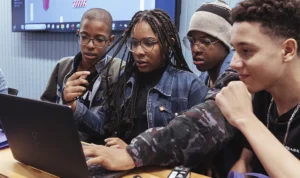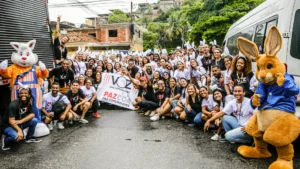Since September 2021, Ramon Brito, 26, from Rio de Janeiro, has worked as a data analyst at iFood. And he thinks that if he could go back in time and tell this to 14-year-old Ramon, he would never believe it. “I got here with many setbacks, with a lot of struggle”, he says. “He would never believe that today I work at a top technology company.”
At 14, Ramon dreamed of working in robotics, but still didn't have much of an idea of how to get there. “I saw a Senai commercial (National Industrial Apprenticeship Service) on TV and wanted to work with robots and technology, but didn't have much guidance. My mother is a housewife and my father was a municipal guard”, he says.
Two years later, the opportunity arose to take the entrance exam at Cefet-RJ (Federal Center for Technological Education Celso Suckow da Fonseca). Ramon took the test, but didn't pass. “Of the 60 questions, I only got 6 correct.” In the same year, his father passed away. “It was a very difficult period for me,” he recalls.
The headwinds did not discourage Ramon. Determined to go to college and learn about technology, he began to prepare by studying on his own, borrowing books from the school library and answering questions with classmates and teachers. “At the end of the year, the school threw a party for the biggest readers, gave them gifts, it was super cool. In the class, I was the only one who liked exact science, everyone read literature”, he laughs.
The effort paid off: Ramon passed the Mathematics course at UERJ (State University of Rio de Janeiro) and became the first person in his family to enter a public university. “It was an absurd joy, but it still wasn't what I wanted, which was programming, assembling robots, developing solutions. But with my grade I couldn’t pass Engineering.”
He continued pursuing his goal of studying Engineering, until he got a scholarship for the Mechanical Engineering course at the Catholic University of Petrópolis, in the mountainous region of Rio. Soon, however, he gave up on college because the tickets to go from Duque de Caxias ( RJ), where he lives with his mother, even the University was very expensive.
The discovery of data science
Determined to continue his journey in the technology field, Ramon took the entrance exam at UERJ again — and this time he passed the Electrical Engineering course. “It was very good, because it was what I wanted, and UERJ had already welcomed me, as it was a pioneering university in quotas”, he says. “There, I met many people who were a minority, who speak my language and suffer the same things.”
Even though he enjoyed college, he still questioned whether he was doing the right thing. “I kept thinking if this was for me, if I was doing it right. I left home every day at four-thirty in the morning, took three trains there and three trains back. Just driving was five hours. I was wondering if it was worth it”, recalls Ramon. “At this age, most people I know are already going to work. But I had a lot of support from my mother, who always encouraged me to continue, saying that with study I would achieve the things I wanted.”
While still in college, Ramon began doing an internship at BNDES (National Bank for Economic and Social Development) and got to know the area of data science. “I worked in the accreditation of machines and equipment, but there were a bunch of people in the bay on the data side. They talked about projects, and I started to open my mind and look at solutions for a business.”
Curious, Ramon started researching the area of data science and looking for internship positions. When a teacher posted about the Let's go AI, technology training offered by iFood in partnership with Resilia, he decided to embark on the idea of preparing to enter this market. “I thought it wouldn't pass, there were 4,700 people running. But I saw that the priority was for black people, women and those who come from public schools and I thought: 'wow, this is for me!'.”
The iFood badge is just the beginning
After passing the selection process, he seized the opportunity. “The course was fundamental, it gave me the basis to enter this job market and opened my vision to a different reality”, says Ramon, who still had to make a difficult choice when he was in the middle of the course.
“I completed my internship at a large bank, with the possibility of a career, it was close to home. I didn’t go, because I was enjoying what I was learning and developing”, he says. “We developed several projects, from a very simple game, choosing 'yes' or 'no' to analyzing League of Legends data.”
At the end of the course, he received an offer to join the iFood team — and another to work at a large TV station with cloud programming and machine learning. Gave iFood. “I chose iFood because of the culture. The way of valuing people, the transparency, the growth, the speed with which everything happens, that impresses me. The company truly includes people and values employees. That, for me, is fundamental.”
With an iFood badge and a planned wedding, this could be the end of Ramon's story. But he warns that this is just the beginning. “I haven't gotten to where I want to be yet. I want to develop more and more and go further. Challenges are what make people evolve. Sometimes we don't get it right the first time, maybe not the second time. But it’s really worth studying, being open to learning, because eventually things happen.”


